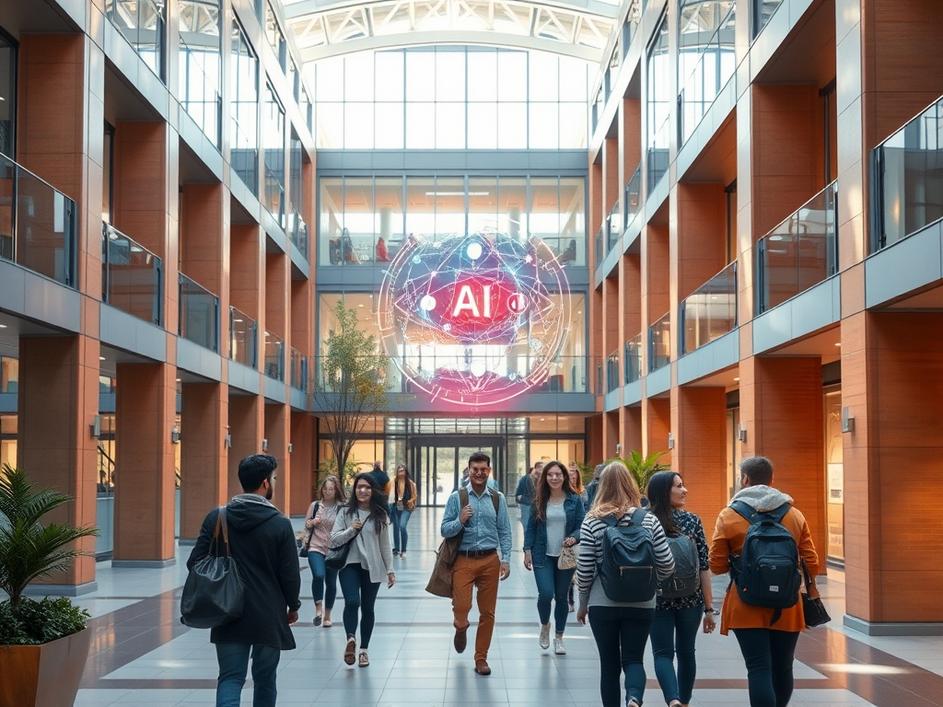


We are a digital agency helping businesses develop immersive, engaging, and user-focused web, app, and software solutions.
2310 Mira Vista Ave
Montrose, CA 91020
2500+ reviews based on client feedback

What's Included?
ToggleAI in education is a big deal right now. For a while, people mostly talked about it for cheating or making things easier in ways that might not be fair. But what if we’re missing the bigger picture? What if artificial intelligence, when used thoughtfully, could actually make learning and teaching better than ever before? This isn’t just about getting quick answers. It’s about building new skills and exploring ideas in ways we couldn’t before. Think of it as a smart new tool in our academic toolbox, something that needs guidance to be used well. That’s why it’s so interesting to see places like the University of Michigan stepping up. They’re not shying away from AI; instead, they’re teaching their community how to use it right. This move shows a real understanding that these tools are here to stay, and the smart thing to do is figure out how to work with them, not against them. It’s a shift from just reacting to AI to actively shaping how it helps us learn and teach. This proactive approach is key for anyone involved in education today, whether you’re a student trying to understand complex topics or a faculty member trying to explain them better.
When we think of AI assistants, many of us picture a simple chat window where you ask a question and get an answer. And sure, they can do that. But tools like Google Gemini are way more powerful than that basic give-and-take. They’ve grown up a lot. Imagine having a personal assistant who helps you sort through a mountain of information, brainstorm ideas when you’re stuck, or even helps you organize your thoughts for a big project. That’s what we’re talking about here. It’s not about outsourcing your brain; it’s about having a co-pilot for your thinking process. Say you’re wrestling with a tricky concept for a paper. Gemini can help you explore different angles, suggest related ideas you might not have considered, or help you outline your arguments clearly. It helps you move from just having a rough idea in your head to seeing it take shape, offering insights that push your work forward. This goes far beyond just spitting out facts; it helps in the creative and critical thinking stages that are so important in school and beyond.
This is where things get really interesting for students and faculty. Imagine trying to make sense of dozens of research papers for a literature review. Or needing to summarize a complex historical period for a lecture. Tools like Gemini, especially when combined with something like NotebookLM, offer truly sophisticated support. NotebookLM, for example, can essentially read all your research materials – your notes, articles, books – and then let you “talk” to them. You can ask it to find connections between different documents, summarize key points from specific sections, or even explain concepts based *only* on the sources you’ve provided. This isn’t about getting an AI to write your paper. It’s about getting an AI to help you *understand* your sources better and faster. It helps you pull together disparate pieces of information, identify themes, and build a stronger foundation for your own original work. For professors, this might mean quickly synthesizing student feedback or organizing lesson plans more efficiently. For students, it means spending less time sifting and more time truly analyzing and thinking deeply about their subject matter.
Having access to these powerful tools is one thing; knowing how to use them effectively and ethically is another. This is precisely why workshops like the one at UMich are so important. It’s easy to just jump in and start typing questions, but getting the most out of AI means learning some specific skills. You need to know how to phrase your requests just right, how to evaluate the information you get back, and how to use it responsibly in your own academic work. Without proper guidance, these tools can be misused or underutilized. Think of it like learning to drive a car. You wouldn’t just hand someone the keys without lessons. The university is essentially providing the driving lessons for this new kind of digital intelligence. They’re showing people not just what Gemini can do, but *how* to make it a reliable partner in learning and discovery. This kind of instruction builds confidence and competence, making sure that students and staff can really make these advanced aids work for them in a way that truly helps their studies and teaching.
From my perspective, this shift isn’t about computers taking over human intelligence. It’s about a fascinating new kind of partnership. Our brains are amazing at big-picture thinking, creativity, and making complex judgments. AI, on the other hand, is incredible at processing huge amounts of data, finding patterns, and generating possibilities based on what it knows. When we put these two together, we get something more powerful than either one alone. Students can spend less time on the tedious parts of research – like searching for specific quotes or summarizing long articles – and more time on the truly critical and creative aspects: asking original questions, developing unique arguments, and putting their own stamp on their work. For educators, it means more time focusing on student engagement and deeper discussions, rather than administrative tasks or repetitive explanations. It changes the nature of intellectual work, allowing us to focus our human strengths where they matter most, while letting AI handle the heavy lifting of information management. This collaboration means we can aim higher and achieve more in our academic pursuits.
As these tools become more integrated into our daily lives, education needs to change too. It’s no longer enough to just teach students how to find information; we also need to teach them how to critically evaluate AI-generated content, how to ask the right questions to get useful AI responses, and how to verify facts that AI provides. This prepares them not just for current academic challenges but for a future workplace where AI tools will be standard. It’s about fostering a new kind of literacy – AI literacy. Universities that offer workshops like this are not just teaching a new piece of software; they are preparing their community for a different way of learning, working, and thinking. This forward-thinking approach means students graduate with a crucial skill set for the modern world, making them more adaptable and effective in whatever path they choose. It’s about making sure that as technology evolves, our educational practices evolve right along with it, keeping pace and making the most of new opportunities.
So, it’s clear that AI in education is much more than a passing trend. It’s a significant shift in how we can approach learning, teaching, and research. The goal isn’t to replace human intelligence or critical thought, but to enhance it. By offering focused training on tools like Google Gemini and NotebookLM, universities like Michigan are showing a great example of how to embrace this new era responsibly. They’re helping students and faculty move from simply using AI to truly understanding it, turning what might seem like a complex new technology into a practical and powerful aid for deep learning and genuine insight. This kind of informed approach is what will really make a difference, allowing us to thoughtfully navigate the exciting and sometimes challenging waters of technological progress in education.



Comments are closed